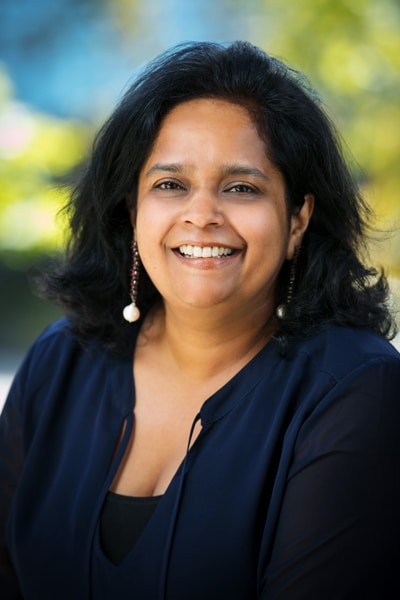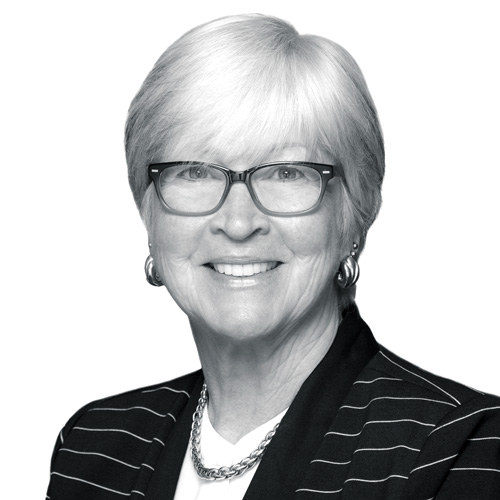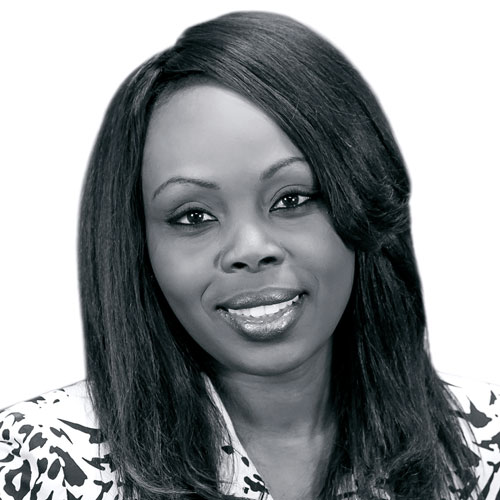In Ruchika Kumar’s family, the legal pedigree is as strong as the moral one.
When she was eighteen, Kumar, who grew up in India, took the written test to get her driver’s license. She passed. But her father forbade her from bribing the local bureaucrat, who refused to issue the license without one. She took the test again, and passed, but her father still insisted that they would not contribute to the corruption endemic to the local government. Kumar finally received her driver’s license—without a bribe—on the fourth attempt.
That outlook continues to support Kumar’s approach at Genentech, where she serves as assistant general counsel. She positions herself as a trusted advisor to the business she works for, providing solutions and guidance in support of the patient, the law, and the partners.
The organization is particularly interested in unmet medical needs, those conditions and communities for which effective treatments are few. It’s that patient interest that drives its business, she says, and she can sense the mission in every meeting. “Even when you’re advising on legal issues, the patient interest is always kept in mind,” Kumar explains. She is continually inspired by the company’s mission, which also includes giving back to the community in the Bay Area.
Kumar took a roundabout course to her current position. After earning her LLB in India, she was eager to broaden her perspective with education in the United States. She applied to the University of Pennsylvania but only let her parents know when she was accepted.
With a great deal of help from her family and community, Kumar left India to further her studies; following that, she served as a one-woman legal department at a number of tech start-ups. Thirteen years ago, she closed that chapter to have her first child, but within a few short months, missed the stimulation and camaraderie of the legal profession.

Returning to work at Genentech, Kumar was excited by the opportunity to learn new territories of the legal business. Over the past twelve years, growing within a large, complex organization, she’s also been able provide some guidance to her colleagues.
“I made a nontraditional switch within Genentech, and through that I learned new areas of the business and acquired new tech skills,” Kumar explains. She’s been conducting training sessions on those skills to help her colleagues grow, and serves as a mentor to a number of her associates.
Besides the contributions she’s made to others, mentoring has helped Kumar reveal and develop herself as a leader. “Not to make stereotypes or generalizations, but culturally, we are told in India not to show off or talk about our achievements,” she says. “I used to always struggle. I didn’t know how to be gracious enough to take a compliment and say thank you; I thought it meant that I was showing off.”
But Kumar has noticed those tendencies among many of her colleagues, regardless of their background. She reminds others to take stock of their own positive qualities, and encourages mentors to provide that mirror for their mentees.
Kumar recalls that her own performance reviews remarked upon her unacknowledged persuasive influence—that she could substantially guide a colleague or a conversation with little recognition of her own presence. Thanks to that
eventual recognition, she has learned to wield that influence with confidence and responsibility. “That confidence does translate into how you lead,” she says. “A lot of people don’t realize the qualities they have; what you’re helping them do, you also have to realize about yourself.”
Kumar made a key realization about herself just two years ago, when Genentech distributed a document detailing five pillars of well-being: physical, financial, social, career, and community. With her children a little older and her career stabilizing, Kumar discovered that she had the opportunity to make a significant investment in that final category. She resolved to develop strong, intentional, mission-based relationships with her community and with relevant service organizations.
“The causes that resonate with me are the ones that involve communities and initiatives to make themselves self-reliant.”
First, she crafted a sort of mission statement. “The causes that resonate with me are the ones that involve communities and initiatives to make themselves self-reliant,” she says. “The collateral benefits are the uplifting of an entire community: individuals lead a life of dignity; women are empowered; children have opportunities for education.” The effects resonate across generations.
To that end, Kumar got involved with Working Solutions, a Bay Area nonprofit which provides microloans to local entrepreneurs, particularly women and minorities, who have difficulty accessing credit. “A lot of these people get refused by banks. We also provide them business advice and financial advice,” she says. Kumar now serves on the advisory board.
She also works with her own neighborhood association to build connections and community close to home. Kumar notes that the distance between their houses, modest as it may be in absolute terms, creates real barriers that can be surprisingly difficult to overcome.
Kumar also takes her family to volunteer at the food bank to ensure that her family’s legacy of service will be as strong in the United States as in India.
“Not having grown up in this country, it always comes as a shock that even in a resource-rich country such as the United States there are those who are hungry, those who don’t have access to schools,” she says. “Now, slowly, I’m getting involved and seeing where I can do this work.”


